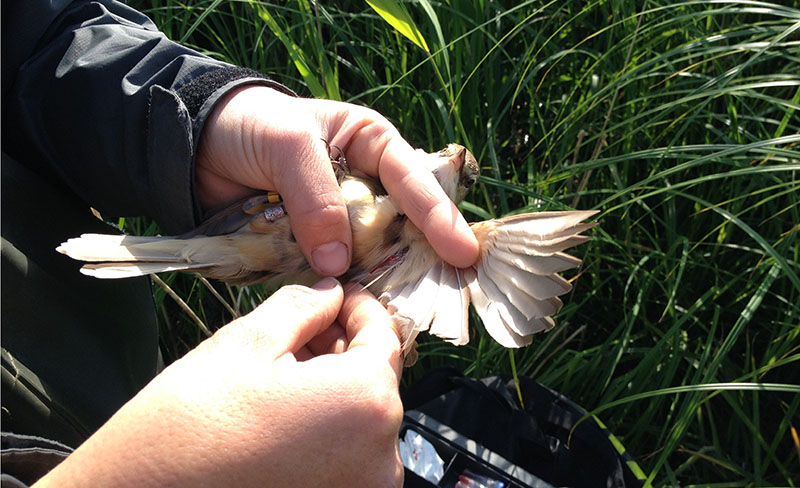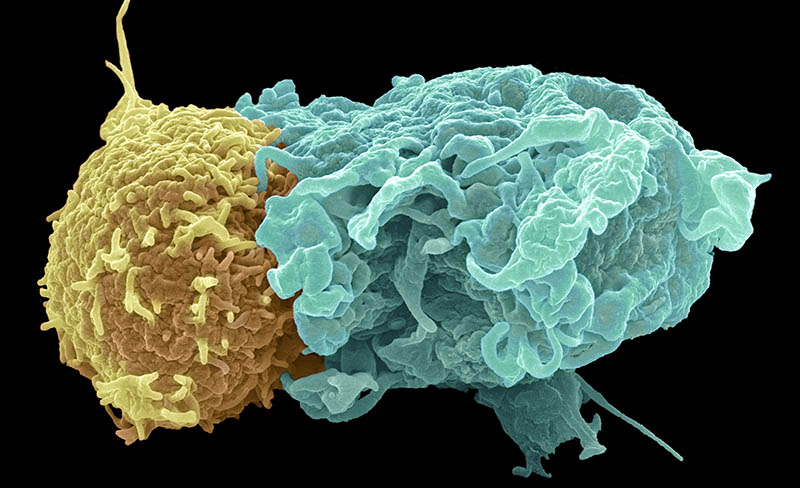Do migratory birds have a better immune system?
Is the immune system of small birds better than that of humans and other mammals? And if so, why? One idea is that small birds have a particularly good immune system because of seasonal migration, which means having to resist many different diseases at breeding, stopover and wintering sites. Is this actually true? Biologist Helena Westerdahl and her colleagues are examining variations between the immune system genes of birds that migrate and those that remain in one place all year round.
WHEN WE ARRIVE IN a new environment that contains unfamiliar pathogens i.e. disease-inducing bacteria, parasites, viruses or fungi, we are more susceptible to illness. This is because our immune system – which recognises and combats pathogens – is adapted to the environment in which we usually live.
Helena Westerdahl has spent a long time studying the immune system’s MHC genes in small birds. MHC (Major Histocompatibility Complex) is a complex of proteins that constitutes an important part of the immune system, helping to reveal the presence of bacteria or a virus in cells, for example.
“Using the faster and more efficient sequencing technology that has been developed over the past decade, we have recently established that it’s true that small birds – passerines – have many more MHC genes per individual than humans and other mammals. On average, birds have 20-21 gene variants per individual and we have 5-6. With this, we have taken the first step in studying MHC diversity, namely the number of gene variants and what they are.”
MHC GENES VARY GREATLY between individuals, and it is believed that this variation is caused by the diseases we are exposed to. In the case of birds, the basic hypothesis is that the selective pressure of exposure to a great diversity of pathogens is expected to favour individuals who can react effectively to a broad spectrum of pathogens. The individuals with an immune system adapted to the pathogens in the environment in which they live are those that are selected – survive – during the process of evolution.
Studies involving humans show that the selective pressure is higher in tropical Africa than here in the north. As the distance from tropical Africa increases, both the number of pathogens and MHC diversity decreases among humans. Helena Westerdahl believes that variation in MHC among small birds also reflects selective pressure. If so, MHC would be higher among small birds that live to the south, near the tropics, than among those here in the north. But what about the migratory birds that fly between tropical Africa and our latitudes?
“Birds in general are exposed to more pathogens than us”
“Birds in general are exposed to more pathogens than us, especially long-distance migratory birds wintering in tropical Africa. They are exposed to all the pathogens in tropical Africa and then to other pathogens when they breed here in the north. In addition, they are exposed to diseases and pathogens during the migration itself, when they stopover in different places. My idea is that we will find greater MHC diversity among migratory birds than resident birds.”
THEY HAVE TAKEN STEP TWO. Now, Helena Westerdahl and her colleagues have examined MHC diversity among resident birds in Europe, resident birds in tropical Africa, migratory birds that fly between tropical Africa and northern Europe, and also those that just migrate a short distance.
“In this study we compare birds over the entire passerine phylogeny, so that we can compensate for evolutionary kinship.”
The analyses are not yet completed. It is, however, very likely that the results will show that resident birds in the north have the least diversity, explains Helena Westerdahl. Beyond that, she sees two possible outcomes. One is that the birds flying between Africa and our latitudes are exposed to the greatest total selective pressure and therefore have the highest diversity. The other is that the birds exposed to high selective pressure all year round, i.e. those in tropical Africa the whole time, have the highest MHC diversity.
“I think it’s exciting that it’s not self-evident, that we don’t know whether it’s the resident birds in Africa or those that migrate that are under the strongest selective pressure,” says Helena Westerdahl. “It could well be that birds that never leave tropical Africa are under the strongest selective pressure.”

New sequencing technology used on a blood sample from a bird can easily read how many MHC gene variants there are in the bird’s DNA. It would have required an enormous amount of work to extract equivalent information before the development of large-scale DNA sequencing in recent years.
HELENA WESTERDAHL WAS ONE OF four young researchers at Lund University to recently receive just over EUR 1 million in “Starting Grants” from the European Research Council (ERC). Her new project will examine aspects such as why songbirds have so many more MHC gene variants than humans. Does it mean, for example, that songbirds are better than humans at resisting diseases? She will collaborate with several immunologists and medical students to examine how songbirds’ MHC molecules function in comparison with human MHC molecules.
“It’s exciting to study wild animals in nature that get no help in fighting their diseases,” says Helena Westerdahl. “This gives us the opportunity to examine the direct connection between diseases, the selective pressure animals are subjected to, and how MHC diversity in the immune system varies between different groups of individuals. We can’t of course study humans under such circumstances.”
Text: Pia Romare
Photos: Jacob Roved
Facts
-
Pathogen
-
An organism that causes disease, e.g. disease-inducing bacteria, viruses, fungi and various parasites.
-
MHC molecules:
-
Major Histocompatibility Complex, a group of genes that code for proteins, constitutes an important part of the immune system enabling the separation of host molecules and foreign molecules. The number of molecules that can be detected by different MHC proteins is determined by the number and nature of MHC genes an individual has.
-
Sequencing:
-
The determination of base pairs’ sequence in DNA. Sequencing makes it possible to determine the structure of DNA, genes and gene variants.
-
Selective pressure:
-
Circumstances that worsen certain individuals’ chances of survival and/or reproduction. Diseases or lack of food are examples of circumstances that constitute selective pressure. Characteristics that make it easier for individuals to survive the more challenging circumstances are favoured in the process of natural selection.
-
Phylogeny:
-
An organism’s phylogeny refers to its evolutionary history, e.g. how different organisms are related to each other.
-
Immunology in brief
-
The immune system acts to defend multi-cell organisms, protecting against infections caused by hostile pathogens such as viruses, bacteria and fungi. The immune system of vertebrate animals is a well-developed system with several “defence levels”. The first is the chemical protective substances on the skin and mucous membranes that prevent “the enemy” from entering. The second defence level is activated if the enemy has penetrated our tissues. In this case, white blood cells start to respond and attack non-host cells that have foreign markings on their surface.
The third, and most specialised, defence level is made up of elements such as T-lymphocytes. The receptors on the surface of T-lymphocytes have the ability to recognise one or more foreign substances, antigens, on the surface of the body’s own cells. T-lymphocytes can only distinguish a host cell from a foreign cell when it is presented by MHC (Major Histocompatibility Complex) molecules, i.e. MHC is the key to this third and most specialised defence level.
If a virus or bacteria protein is inside one of the body’s cells, MHC molecules will react and transport the foreign protein to the surface of the cell. On the surface, the MHC molecule and the foreign protein act together as an antigen, which a T-lymphocyte can recognise. When the special “killer T-cell” and antigen connect, the T-cell releases substances that kill the infected cells.





